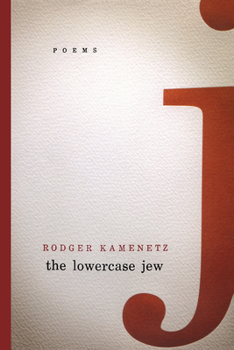The Lowercase Jew
Select Format
Select Condition 
Book Overview
As dismissal and disdain of Jews speak through the art of some leading twentieth-century poets, so the poetry of Rodger Kamenetz artfully answers, framing in subtle terms the questions that haunt our culture-about the voices through which culture speaks, about the identity of poet and poetry, about the capacity of art to harm and to heal. Whether subjecting the anti-Semitic verses of T. S. Eliot to a literary trial; conjuring the eloquence with which "Allen Ginsberg forgives Ezra Pound on Behalf of the Jews"; or drawing upon personal history, the Torah, and Jewish mysticism to explore the tangled relations of Jewish identity and modern literature, Kamenetz's poems attest to the inexorable power of language.
Format:Paperback
Language:English
ISBN:0810151529
ISBN13:9780810151529
Release Date:September 2003
Publisher:Triquarterly Books
Length:96 Pages
Weight:0.25 lbs.
Dimensions:0.3" x 6.0" x 9.0"
Related Subjects
PoetryCustomer Reviews
2 ratings
Wonderful Poems, Thoroughly Engaging
Published by Thriftbooks.com User , 21 years ago
There is a poem in here addressed to T.S. Eliot that made me laugh out loud. Also, loved the one addressed to Ginsberg and his comments to Pound. These poems are lovely, lyrical and captivating. They are serious and politically charged without ever losing their witty edge. Don't read the end if your hungry, there are some odes to some tantalizing morsels that are mouthwatering.
Jerusalem Post review
Published by Thriftbooks.com User , 21 years ago
The Jerusalem PostSeptember 19, 2003, FridayThe Jew in the poetBYLINE: P. David HornikThe Lowercase Jew by Rodger Kamenetz. Triquarterly Books. 96 pp. $ 12.95In this book Rodger Kamenetz, the American Jewish poet best known for The Jew in the Lotus - an account of Jewish- Buddhist dialogue - draws on his wide range of Jewish knowledge and feelings to produce a set of poems that are always interesting, of varied quality, and sometimes stunningly powerful.The book is divided into four sections, of which the first two, "Grandfather Clause" and "Torah," are the most compelling. The poems in "Grandfather Clause" are about the legacy of anti-Semitism, a sensitive but also much-trodden subject that Kamenetz handles with tact and originality. The deeply serious My Holocaust, a five-pages-long meditation about having a vicarious, hence inherently problematic relation to the catastrophe, is strikingly honest and convincing. In a lighter vein is The Lowercase Jew, in which T. S. Eliot stands trial for the nasty anti- Semitism that mars his verse. Eliot's main accuser is his own anti-Semitic creation Bleistein, whom Kamenetz colorfully and comically projects as a gruff, earthy Chicagoan Jew who assures Eliot that It's punishment for you, but also me.I have to read these farkakta linesyou wrote about the Jews.Later Bleistein grouses:London and Jerusalem,you called them unreal cities.Maybe what made those cities unrealwas you never saw the people in them.The lines maintain the standup-comic tone while making a serious point about the coldness of this patrician poet. Nothing in The Lowercase Jew is meant to detract from Eliot's greatness, but Bleistein's indignant ramblings cleverly capture his shortcomings.The second section, "Torah," offers poems that are intensive, midrashic interactions with biblical texts. Adam, Earthling and Adam, Golem are abstruse, straining too hard to make connections between a disjunct modern consciousness and the archetypal First Man. Genesis 1: 1 well evokes, in 16 lines, the impenetrable mystery of that verse; The Broken Tablets poignantly imagines the fate of Moses' first pair of tablets, their shards carried in the Ark all the way to the Promised Land. But the highlights of the section are Noah's Grapes, a bitterly powerful statement on aging and sexual decline; and the extraordinary Naming the Angel, which memorably interprets Jacob's night-long wrestle with the angel in terms of solitude and alienation. After his protracted, frustrating encounter with the mysterious being, Jacob wonders in anguish:Maybe nothing moves downthe ladder but what we ask for, if in greed,then greed, if in anger, then horned angergores our nights. Nothing walks down the ladderbut what we dream on the hard rock.These lines well exemplify Kamenetz's genius for rendering voices and mental states, his psychological insight and constant search for meaning.Kamenetz is also a laudably courageous poet, not shrinking from themes like the Holocaust and quintess





